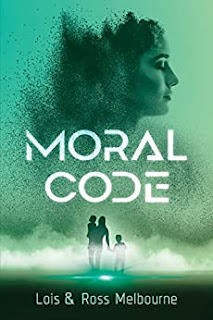Lois Melbourne is the author, with her husband, Ross Melbourne, of the new novel Moral Code. The Melbournes founded a software company, of which Lois Melbourne was the CEO. Her other books include Kids Go To Work Day. She lives in Texas.
Q: What inspired you to write Moral Code, and how did you create your character Dr. Keira Stetson?
A: A discussion with my husband Ross centered around artificial intelligence and its ethical dynamics. He mentioned that if he could write a book, it would be about AIs and their ability to protect children. We both agreed that the defense of kids would be the most ethical focus you could give an AI.
We started brainstorming story lines. I knew there was a great story to deliver when I imagined an AI challenging the cycle of abuse creating more abusers. I’ve lived with abuse and each child deals with it differently. While some grow stronger, others are shredded.
I want to live in a world where kids are truly shielded, so they can thrive. It won’t be easy to get there, and others will want to manipulate the technology. I had to help imagine the possibilities.
My Dr. Keira Stetson is very pragmatic. She starts off in college creating her Moral Operating System to provide ethical guardrails for the development of AIs. She faces her cohorts considering her a company-killer when her guidelines expose some of their business models as questionable.
As her AI, Elly, develops, Keira realizes together they can help abused kids in her area. This brings on conflict in her definitions of what is ethical. Are there degrees or tradeoffs that must be made to stay within the boundaries?
Q: What do you think the novel says about the role of artificial intelligence?
A: I created the AI I would want to build. I’m not a dystopian kind of person. I would create entities that would help people, especially kids.
One challenge we have now with artificial intelligence is the data being used to train them. AIs are not programmed to function, they are trained to function. In order to assemble large enough data sets, many organizations are using the internet as one of their primary data sources. This creates a lot of misinformation, as well as bias data for the AI’s training consumption. It’s a problem a lot of data scientists are calling out currently.
Q: How did the two of you collaborate on the book, and what was your writing process like?
A: We co-founded a software company in 1994 and sold it to a private-equity firm in 2011, retiring in 2013. My role as the CEO placed me directly between our customers and Ross, the chief technology officer, and his team. We are accustomed to collaborating.
Ross is a technologist, always ahead of the curve. His work with robotics and AI keeps him informed about the progress and capabilities within the field.
We’d brainstorm futuristic, but realistic, technology and how it could play a role in telling the Moral Code story. He’d teach me about some tech, often creating detailed descriptions of its capabilities. I’d then do further research on proposed applications to help me visualize the possibilities. Then, I’d write.
A few times subplots had to be rewritten because we projected developments far out in the future and I’d read an MIT article announcing something similar was actionable now. Sometimes the rewrite came about because Ross could see something on the horizon which spiced up the story.
It was a very iterative process, especially since Moral Code is my third book, but first novel. I learned a lot about the craft of novel writing during this process.
Q: What do you hope readers take away from the story?
A: I hope readers see possibility in the future of technology, if it’s developed right. I also challenge people to think about the contributors to abuse, neglect, bad performance, and other social ills. They may not have an Elly to help fix the issues, yet. But hopefully they consider what they can do themselves.
I want people to ask themselves what is important enough to make you disrupt your status quo and take risks for the betterment of others.
Hopefully I’ll inspire someone to create my Elly, like Snowcrash inspired Google Earth and Star Trek inspired the flip phone.
Q: What are you working on now?
A: I’m working on a novel drawing on the power of women working together. It ties the strength of women connected in the present and powerful ladies from the past. No time travel, but the past has a lot to offer us.
The greatest gifts in my life are relationships. We need to celebrate the good ones and choose wisely to avoid the toxic ones.
Q: Anything else we should know?
A: I know each genre has its fans and its detractors. Science fiction is a wonderful genre to explore for deep book club discussions or for exploring society’s norms. The tools available for the sci-fi writer afford a leverage into exposing topics that can sneak up on the reader. Oftentimes it’s the stuff hiding in plain sight that reveal the issues or the answers we really need to ponder.
If you haven’t read much sci-fi, you may not realize it’s not all alien space operas or starship battles. Moral Code could be your gateway to a new favorite genre.
--Interview with Deborah Kalb


No comments:
Post a Comment